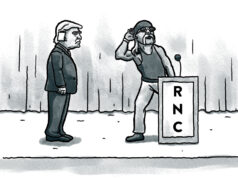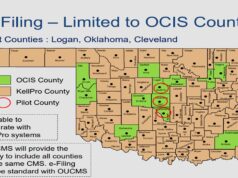
If you paid attention in high school civics, you know the three branches of American government. In recent years, two of those branches — the executive and legislative — have become ripe for ridicule.
For the past eight years, the U.S. Congress has seen an approval rating below 20 percent. President Donald Trump’s approval rating is hovering around 32 percent, and Oklahoma Gov. Mary Fallin’s has been measured at 35 percent.
Meanwhile, trust in America’s third branch of government — the judicial branch — stands at 68 percent. Two occurrences this past week, however, could eat into public confidence in the judicial process as well. These recent events should remind politicians and jurists alike that making a mockery of the legal system is an easy way to look foolish.
‘No justification at all’
In Iowa, a state supreme court justice has blocked the Des Moines Register from publishing information obtained from a specific set of court records that were sealed after being previously released to the newspaper.
To quote constitutional advocate Walter Sobchak, “The Supreme Court has roundly rejected prior restraint!”
The Des Moines Register, of course, has written of its own legal battle:
The Dec. 11 order prohibits the Register, at least temporarily, from publishing information from court records that were sealed from public view after the Register obtained copies.
“Pending further order from this court, the defendants shall not disclose or share, other than with legal counsel, any information in the defendants’ possession that was obtained exclusively from the reports,” the order says.
Gregg Leslie, the legal defense director for the Reporters Committee for Freedom of the Press, called the court order “very unusual.”
“Prior restraint should be a measure of last resort. In this case, we have these publicly obtained documents that were accessed without violating any rule or order,” Leslie said. “There seems to be no justification at all for imposing prior restraint on your reporting.”
The Register’s attorney, Michael Giudicessi, has asked the Iowa Supreme Court to vacate the order, arguing in court filings that “the United States Supreme Court has never approved imposition of a prior restraint against the news media and the court has suggested it would consider doing so only in dire situations, such as matters of national security when the country is at war.”
Michael Petersen nomination an embarrassment
At the federal level, America witnessed one of the year’s most awkward public hearings when U.S. senators questioned five judicial nominees, one of whom — Federal Election Commission member Matthew Petersen — has never tried a case to verdict.
Facing U.S. Sen. John Kennedy (R-Louisiana), Petersen could not answer a handful of questions essential to the duties of a U.S. District Court judge. What is the Daubert standard? What is a motion in limine? What is the Younger abstention doctrine? What is the Pullman abstention doctrine?
Petersen may not be the first judicial nominee with a scant trial resume, but the American judicial system would be best served if he is the last.
The issue, of course, is not partisan. Kennedy is a Republican, and Petersen has been nominated by Trump to serve the District of Columbia. After the hearing, Kennedy explained his questions succinctly in a statement:
I enthusiastically supported President Trump for president, and I still do. In the past year, I have supported nearly every one of President Trump’s picks, but I don’t blindly support them. I ask questions that I expect them to be able to answer. In doing so, I’m just doing my job. That’s why we have a Madisonian-inspired separation of powers. We need checks and balances so that we can serve the American people well.
Those checks and balances are critical to the success of American democracy, and it’s clear that the judiciary is the only branch of government that currently has the trust of a majority of Americans.
Shortsighted decisions like the one issued in Iowa combined with laughable nominations like that of Michael Petersen threaten that confidence.
(Editor’s note: Monday afternoon, word spread that Michael Petersen had withdrawn his name from judicial consideration.)




















